高三英语作文:应不应该限制电视广告
- 格式:docx
- 大小:37.85 KB
- 文档页数:2
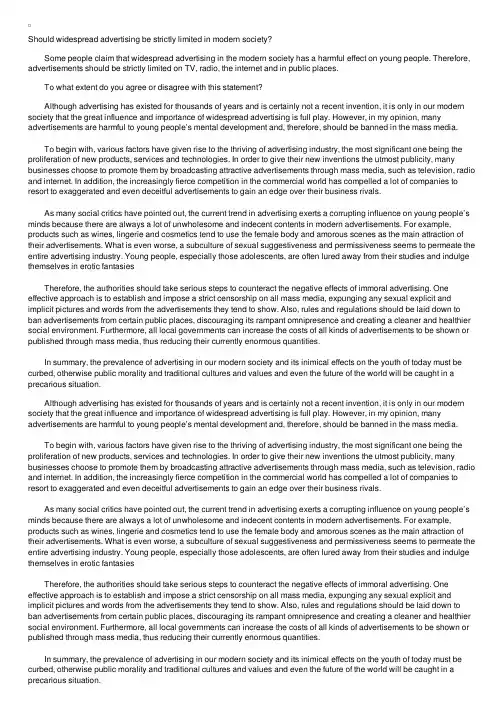
Should widespread advertising be strictly limited in modern society? Some people claim that widespread advertising in the modern society has a harmful effect on young people. Therefore, advertisements should be strictly limited on TV, radio, the internet and in public places. To what extent do you agree or disagree with this statement? Although advertising has existed for thousands of years and is certainly not a recent invention, it is only in our modern society that the great influence and importance of widespread advertising is full play. However, in my opinion, many advertisements are harmful to young people’s mental development and, therefore, should be banned in the mass media. To begin with, various factors have given rise to the thriving of advertising industry, the most significant one being the proliferation of new products, services and technologies. In order to give their new inventions the utmost publicity, many businesses choose to promote them by broadcasting attractive advertisements through mass media, such as television, radio and internet. In addition, the increasingly fierce competition in the commercial world has compelled a lot of companies to resort to exaggerated and even deceitful advertisements to gain an edge over their business rivals. As many social critics have pointed out, the current trend in advertising exerts a corrupting influence on young people’s minds because there are always a lot of unwholesome and indecent contents in modern advertisements. For example, products such as wines, lingerie and cosmetics tend to use the female body and amorous scenes as the main attraction of their advertisements. What is even worse, a subculture of sexual suggestiveness and permissiveness seems to permeate the entire advertising industry. Young people, especially those adolescents, are often lured away from their studies and indulge themselves in erotic fantasies Therefore, the authorities should take serious steps to counteract the negative effects of immoral advertising. One effective approach is to establish and impose a strict censorship on all mass media, expunging any sexual explicit and implicit pictures and words from the advertisements they tend to show. Also, rules and regulations should be laid down to ban advertisements from certain public places, discouraging its rampant omnipresence and creating a cleaner and healthier social environment. Furthermore, all local governments can increase the costs of all kinds of advertisements to be shown or published through mass media, thus reducing their currently enormous quantities. In summary, the prevalence of advertising in our modern society and its inimical effects on the youth of today must be curbed, otherwise public morality and traditional cultures and values and even the future of the world will be caught in a precarious situation. Although advertising has existed for thousands of years and is certainly not a recent invention, it is only in our modern society that the great influence and importance of widespread advertising is full play. However, in my opinion, many advertisements are harmful to young people’s mental development and, therefore, should be banned in the mass media. To begin with, various factors have given rise to the thriving of advertising industry, the most significant one being the proliferation of new products, services and technologies. In order to give their new inventions the utmost publicity, many businesses choose to promote them by broadcasting attractive advertisements through mass media, such as television, radio and internet. In addition, the increasingly fierce competition in the commercial world has compelled a lot of companies to resort to exaggerated and even deceitful advertisements to gain an edge over their business rivals. As many social critics have pointed out, the current trend in advertising exerts a corrupting influence on young people’s minds because there are always a lot of unwholesome and indecent contents in modern advertisements. For example, products such as wines, lingerie and cosmetics tend to use the female body and amorous scenes as the main attraction of their advertisements. What is even worse, a subculture of sexual suggestiveness and permissiveness seems to permeate the entire advertising industry. Young people, especially those adolescents, are often lured away from their studies and indulge themselves in erotic fantasies Therefore, the authorities should take serious steps to counteract the negative effects of immoral advertising. One effective approach is to establish and impose a strict censorship on all mass media, expunging any sexual explicit and implicit pictures and words from the advertisements they tend to show. Also, rules and regulations should be laid down to ban advertisements from certain public places, discouraging its rampant omnipresence and creating a cleaner and healthier social environment. Furthermore, all local governments can increase the costs of all kinds of advertisements to be shown or published through mass media, thus reducing their currently enormous quantities. In summary, the prevalence of advertising in our modern society and its inimical effects on the youth of today must be curbed, otherwise public morality and traditional cultures and values and even the future of the world will be caught in a precarious situation.。
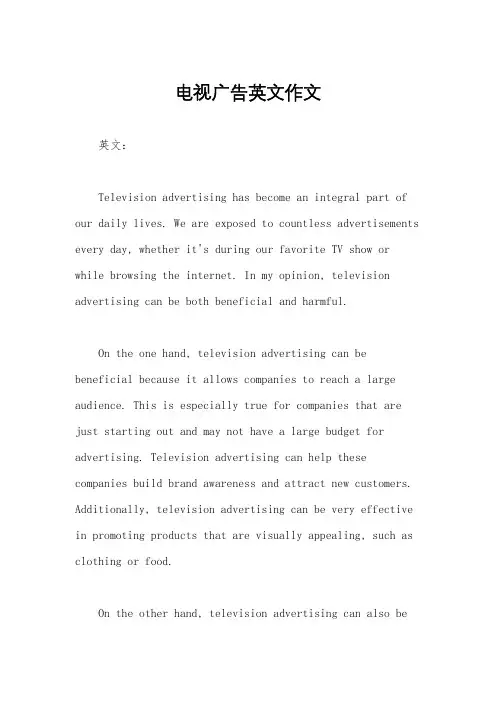
电视广告英文作文英文:Television advertising has become an integral part of our daily lives. We are exposed to countless advertisements every day, whether it's during our favorite TV show or while browsing the internet. In my opinion, television advertising can be both beneficial and harmful.On the one hand, television advertising can be beneficial because it allows companies to reach a large audience. This is especially true for companies that are just starting out and may not have a large budget for advertising. Television advertising can help these companies build brand awareness and attract new customers. Additionally, television advertising can be very effective in promoting products that are visually appealing, such as clothing or food.On the other hand, television advertising can also beharmful. Some advertisements can be misleading or promote unhealthy products. For example, fast food advertisements often show delicious-looking burgers and fries, but they don't mention the negative health effects of consuming too much fast food. Additionally, some advertisements can be annoying or intrusive, especially if they interrupt our favorite TV show or movie.Overall, I believe that television advertising can be both beneficial and harmful. It's up to us as consumers to be aware of the messages that advertisements are promoting and to make informed decisions about the products we buy.中文:电视广告已经成为我们日常生活中不可或缺的一部分。
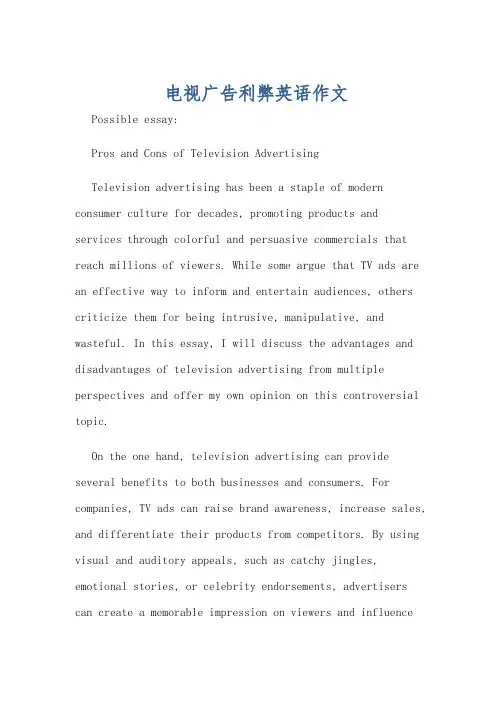
电视广告利弊英语作文Possible essay:Pros and Cons of Television AdvertisingTelevision advertising has been a staple of modern consumer culture for decades, promoting products and services through colorful and persuasive commercials that reach millions of viewers. While some argue that TV ads are an effective way to inform and entertain audiences, others criticize them for being intrusive, manipulative, and wasteful. In this essay, I will discuss the advantages and disadvantages of television advertising from multiple perspectives and offer my own opinion on this controversial topic.On the one hand, television advertising can provide several benefits to both businesses and consumers. For companies, TV ads can raise brand awareness, increase sales, and differentiate their products from competitors. By using visual and auditory appeals, such as catchy jingles, emotional stories, or celebrity endorsements, advertisers can create a memorable impression on viewers and influencetheir purchasing decisions. Moreover, TV ads can target specific demographics and regions, based on the time of day, the channel, or the program, which can optimize the impact and efficiency of the ad campaign. For instance, a sports drink company may air its ads during a football game, when many male viewers are likely to watch and identify with the athletic imagery and message.For consumers, television advertising can also offer some advantages, such as entertainment, education, and convenience. Some ads are humorous, creative, or informative, and can enhance the viewing experience by providing a break from the program or a source ofinspiration or knowledge. For example, a car ad may showcase the features and benefits of a new model, such as fuel economy, safety ratings, or connectivity, that the viewer may not have known before. Moreover, TV ads can save consumers time and energy by informing them about new products or services that match their needs or preferences, without having to search for them online or in stores. For example, a parent may be interested in a new toy that their child would enjoy, and may learn about it through a commercial that airs during a kids' show.On the other hand, television advertising has several drawbacks that may outweigh its benefits, depending on the context and perspective. For one thing, TV ads can be annoying, disruptive, and intrusive, especially when they interrupt a program or repeat the same message too often. Some viewers may feel that they are being manipulated or deceived by advertisers who use exaggerated or false claims to sell their products, or who exploit their emotions or fears to create a sense of urgency or need. Moreover, TV ads can be expensive, both for the companies that produce them and for the consumers who pay for them indirectly by buying the advertised products. Advertisers may spend millions of dollars on a single ad campaign, which may inflate the prices of their products or lower the quality of their services, or both. Consumers may also pay more for the same product or service that they could have found through other means, such as word-of-mouth recommendations, online reviews, or personal experiences.Furthermore, television advertising can have negative effects on society and culture, by promoting materialism, consumerism, and superficial values. Advertisers may create unrealistic expectations or standards of beauty, success,or happiness that can lead to dissatisfaction, anxiety, or depression among viewers who cannot or do not want to meet them. Moreover, TV ads may reinforce stereotypes, biases, or prejudices that can perpetuate social inequality or discrimination. For example, a cosmetic ad that features only white, young, and thin models may exclude or marginalize viewers who belong to other demographics, or who have different body types, ages, or ethnicities. Finally, TV ads may contribute to environmental problems, such as waste, pollution, or climate change, by promoting products or behaviors that are harmful to the planet or unsustainable in the long term. For example, an ad that encourages people to buy more cars or use more fossil fuels may exacerbate the global warming crisis and endangerfuture generations.In conclusion, television advertising can have both advantages and disadvantages, depending on the goals, methods, and effects of the ad campaign. While TV ads can inform, entertain, and persuade viewers, they can also annoy, deceive, and harm them, as well as contribute to social, cultural, and environmental issues. Therefore, it is important for advertisers, consumers, and regulators tobe aware of the pros and cons of television advertising,and to make informed and responsible decisions based ontheir values, needs, and interests. As a consumer, I think that TV ads can be useful and enjoyable if they are relevant, truthful, and respectful of my time and attention. As a citizen, I also think that TV ads should be subject to ethical and legal standards that protect the publicinterest and the common good.。
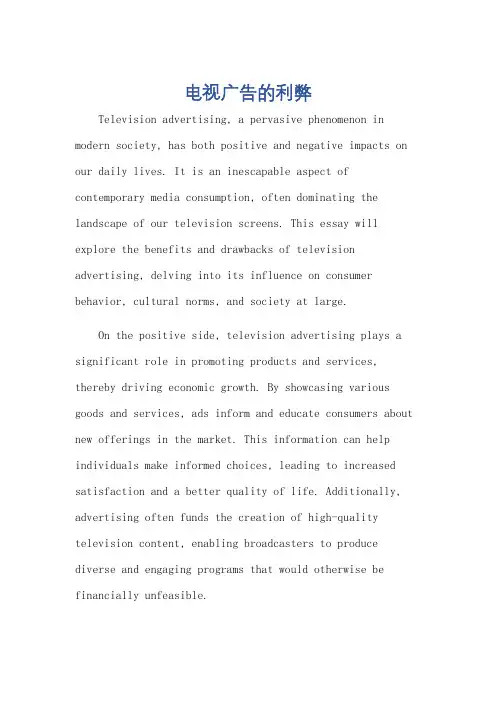
电视广告的利弊Television advertising, a pervasive phenomenon in modern society, has both positive and negative impacts on our daily lives. It is an inescapable aspect of contemporary media consumption, often dominating the landscape of our television screens. This essay will explore the benefits and drawbacks of television advertising, delving into its influence on consumer behavior, cultural norms, and society at large.On the positive side, television advertising plays a significant role in promoting products and services, thereby driving economic growth. By showcasing various goods and services, ads inform and educate consumers about new offerings in the market. This information can help individuals make informed choices, leading to increased satisfaction and a better quality of life. Additionally, advertising often funds the creation of high-quality television content, enabling broadcasters to produce diverse and engaging programs that would otherwise be financially unfeasible.However, the negative aspects of television advertising are also noteworthy. One significant concern is the manipulation of consumer behavior. Through the use of persuasive techniques, such as emotional appeals and celebrity endorsements, advertisers often attempt to influence viewers' purchasing decisions. This can lead to impulsive buying and overconsumption, which can have negative consequences on personal finances and environmental sustainability.Furthermore, television advertising can contribute to the homogenization of culture. By promoting a narrow range of products and lifestyles, it can reinforce stereotypical ideas about gender roles, social class, and other aspects of identity. This can limit the diversity of representation in media and restrict individuals' ability to express their unique identities.Moreover, the constant bombardment of advertisements can be intrusive and disruptive to the viewer's experience. The frequent interruption of programs with commercials can be frustrating, and the excessive noise and visual stimulation of some ads can be overwhelming. This can leadto viewer fatigue and a general aversion to television advertising.In conclusion, television advertising has both benefits and drawbacks. While it plays a crucial role in promoting products and services and funding media content, it also has the potential to manipulate consumer behavior, homogenize culture, and disrupt the viewer's experience. It is, therefore, important to approach television advertising with a critical eye, recognizing its influence while also maintaining a sense of autonomy and rationality in our consumption decisions.**电视广告的利弊**电视广告作为现代社会中普遍存在的现象,对我们的日常生活产生了正反两面的影响。
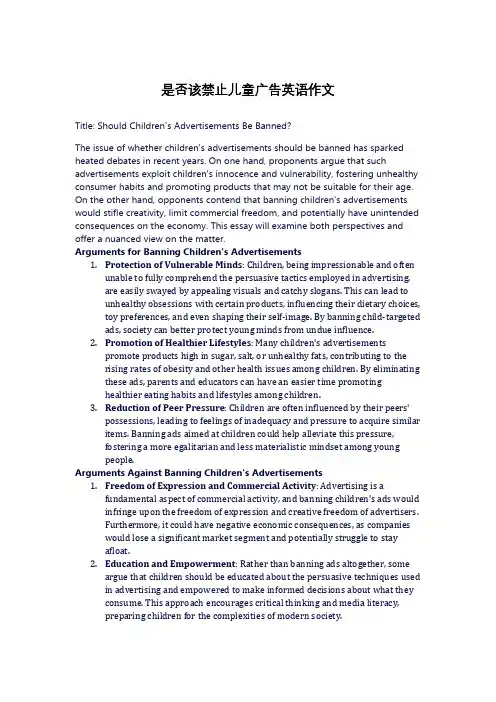
是否该禁止儿童广告英语作文Title: Should Children's Advertisements Be Banned?The issue of whether children's advertisements should be banned has sparked heated debates in recent years. On one hand, proponents argue that such advertisements exploit children's innocence and vulnerability, fostering unhealthy consumer habits and promoting products that may not be suitable for their age. On the other hand, opponents contend that banning children's advertisements would stifle creativity, limit commercial freedom, and potentially have unintended consequences on the economy. This essay will examine both perspectives and offer a nuanced view on the matter.Arguments for Banning Children's Advertisements1.Protection of Vulnerable Minds: Children, being impressionable and oftenunable to fully comprehend the persuasive tactics employed in advertising,are easily swayed by appealing visuals and catchy slogans. This can lead tounhealthy obsessions with certain products, influencing their dietary choices, toy preferences, and even shaping their self-image. By banning child-targeted ads, society can better protect young minds from undue influence.2.Promotion of Healthier Lifestyles: Many children's advertisementspromote products high in sugar, salt, or unhealthy fats, contributing to therising rates of obesity and other health issues among children. By eliminating these ads, parents and educators can have an easier time promotinghealthier eating habits and lifestyles among children.3.Reduction of Peer Pressure: Children are often influenced by their peers'possessions, leading to feelings of inadequacy and pressure to acquire similar items. Banning ads aimed at children could help alleviate this pressure,fostering a more egalitarian and less materialistic mindset among youngpeople.Arguments Against Banning Children's Advertisements1.Freedom of Expression and Commercial Activity: Advertising is afundamental aspect of commercial activity, and banning children's ads would infringe upon the freedom of expression and creative freedom of advertisers.Furthermore, it could have negative economic consequences, as companieswould lose a significant market segment and potentially struggle to stayafloat.cation and Empowerment: Rather than banning ads altogether, someargue that children should be educated about the persuasive techniques used in advertising and empowered to make informed decisions about what theyconsume. This approach encourages critical thinking and media literacy,preparing children for the complexities of modern society.3.Cultural and Artistic Value: Children's advertisements often incorporatecolorful visuals, catchy music, and creative storytelling, contributing to therich tapestry of contemporary culture. Banning these ads would deprivechildren of a source of entertainment and creativity, potentially stifling their imagination and appreciation for the arts.ConclusionThe debate over whether children's advertisements should be banned is multifaceted and complex. While there are valid concerns about the potential negative impacts of such ads on children's health, well-being, and consumer habits, a blanket ban may not be the most effective solution. Instead, a more nuanced approach that combines regulation, education, and empowerment could strike a balance between protecting children and preserving the benefits of advertising. By teaching children how to critically evaluate the messages they receive, we can empower them to make informed choices and develop healthy consumer habits that will last a lifetime.。
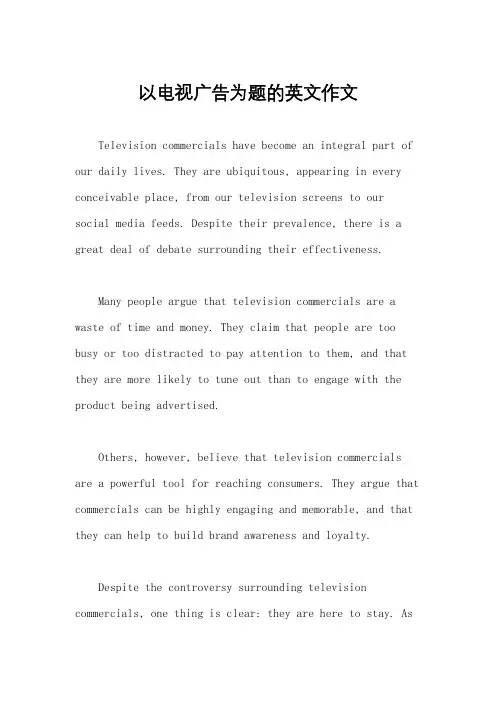
以电视广告为题的英文作文Television commercials have become an integral part of our daily lives. They are ubiquitous, appearing in every conceivable place, from our television screens to oursocial media feeds. Despite their prevalence, there is a great deal of debate surrounding their effectiveness.Many people argue that television commercials are a waste of time and money. They claim that people are too busy or too distracted to pay attention to them, and that they are more likely to tune out than to engage with the product being advertised.Others, however, believe that television commercials are a powerful tool for reaching consumers. They argue that commercials can be highly engaging and memorable, and that they can help to build brand awareness and loyalty.Despite the controversy surrounding television commercials, one thing is clear: they are here to stay. Aslong as there are products to sell and people to sell them to, advertisers will continue to use television commercials as a way to reach their target audience.Of course, the effectiveness of television commercials depends largely on the quality of the commercial itself. A well-crafted commercial can capture people's attention, evoke emotion, and leave a lasting impression. A poorly executed commercial, on the other hand, can do more harm than good, turning people off to the product being advertised.In the end, the success of a television commercial comes down to its ability to connect with its audience. Whether through humor, emotion, or sheer spectacle, a good commercial is one that leaves people talking and, ultimately, drives sales.。
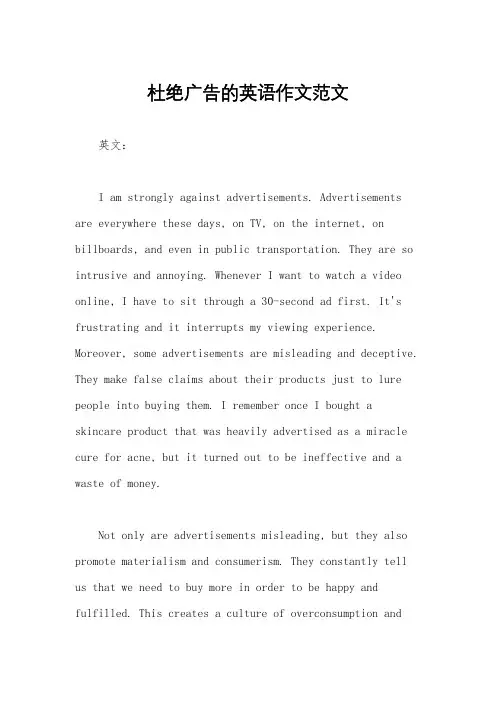
杜绝广告的英语作文范文英文:I am strongly against advertisements. Advertisements are everywhere these days, on TV, on the internet, on billboards, and even in public transportation. They are so intrusive and annoying. Whenever I want to watch a video online, I have to sit through a 30-second ad first. It's frustrating and it interrupts my viewing experience. Moreover, some advertisements are misleading and deceptive. They make false claims about their products just to lure people into buying them. I remember once I bought a skincare product that was heavily advertised as a miracle cure for acne, but it turned out to be ineffective and a waste of money.Not only are advertisements misleading, but they also promote materialism and consumerism. They constantly tell us that we need to buy more in order to be happy and fulfilled. This creates a culture of overconsumption andwaste, which is harmful to the environment. The constant bombardment of advertisements also contributes to mental stress and anxiety. We are constantly being told that we are not good enough, and that we need to buy this or thatin order to be better.In addition, advertisements often objectify and sexualize women and perpetuate harmful stereotypes. They portray unrealistic beauty standards and contribute to body image issues, especially among young people. It's unacceptable to use women's bodies as a tool for selling products. Advertisements should be more responsible and ethical in their approach.Overall, I believe that we should strive to eliminate or at least reduce the amount of advertisements in ourdaily lives. We need to create a more peaceful and less materialistic society, where people are not constantly bombarded with consumerist messages.中文:我非常反对广告。
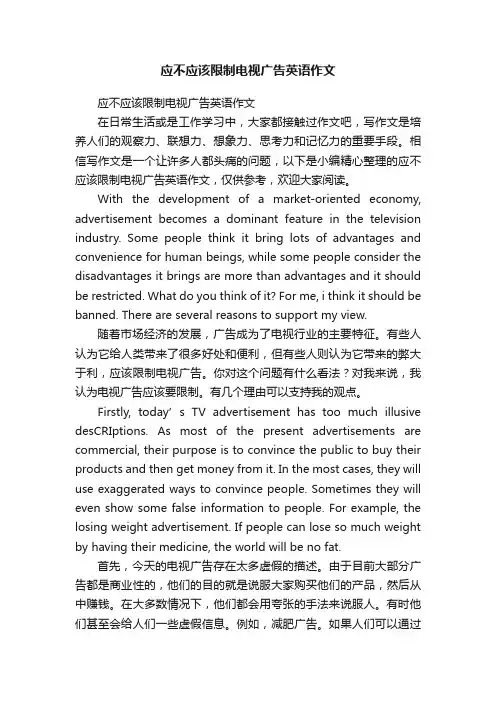
应不应该限制电视广告英语作文应不应该限制电视广告英语作文在日常生活或是工作学习中,大家都接触过作文吧,写作文是培养人们的观察力、联想力、想象力、思考力和记忆力的重要手段。
相信写作文是一个让许多人都头痛的问题,以下是小编精心整理的应不应该限制电视广告英语作文,仅供参考,欢迎大家阅读。
With the development of a market-oriented economy, advertisement becomes a dominant feature in the television industry. Some people think it bring lots of advantages and convenience for human beings, while some people consider the disadvantages it brings are more than advantages and it should be restricted. What do you think of it? For me, i think it should be banned. There are several reasons to support my view.随着市场经济的发展,广告成为了电视行业的主要特征。
有些人认为它给人类带来了很多好处和便利,但有些人则认为它带来的弊大于利,应该限制电视广告。
你对这个问题有什么看法?对我来说,我认为电视广告应该要限制。
有几个理由可以支持我的观点。
Firstly, today’s TV a dvertisement has too much illusive desCRIptions. As most of the present advertisements are commercial, their purpose is to convince the public to buy their products and then get money from it. In the most cases, they will use exaggerated ways to convince people. Sometimes they will even show some false information to people. For example, the losing weight advertisement. If people can lose so much weight by having their medicine, the world will be no fat.首先,今天的电视广告存在太多虚假的描述。
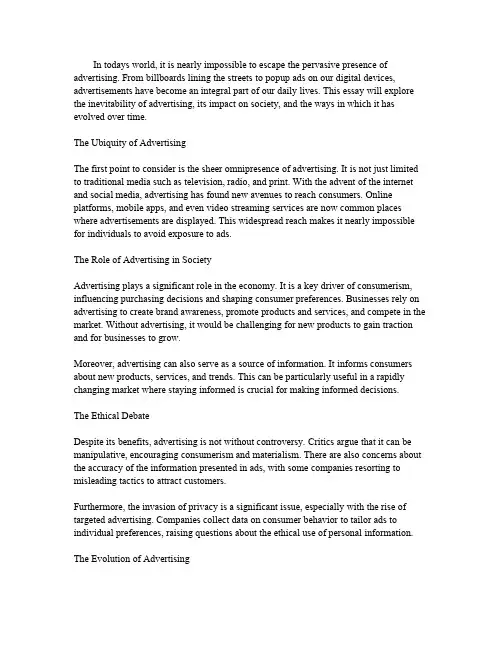
In todays world,it is nearly impossible to escape the pervasive presence of advertising.From billboards lining the streets to popup ads on our digital devices, advertisements have become an integral part of our daily lives.This essay will explore the inevitability of advertising,its impact on society,and the ways in which it has evolved over time.The Ubiquity of AdvertisingThe first point to consider is the sheer omnipresence of advertising.It is not just limited to traditional media such as television,radio,and print.With the advent of the internet and social media,advertising has found new avenues to reach consumers.Online platforms,mobile apps,and even video streaming services are now common places where advertisements are displayed.This widespread reach makes it nearly impossible for individuals to avoid exposure to ads.The Role of Advertising in SocietyAdvertising plays a significant role in the economy.It is a key driver of consumerism, influencing purchasing decisions and shaping consumer preferences.Businesses rely on advertising to create brand awareness,promote products and services,and compete in the market.Without advertising,it would be challenging for new products to gain traction and for businesses to grow.Moreover,advertising can also serve as a source of information.It informs consumers about new products,services,and trends.This can be particularly useful in a rapidly changing market where staying informed is crucial for making informed decisions.The Ethical DebateDespite its benefits,advertising is not without controversy.Critics argue that it can be manipulative,encouraging consumerism and materialism.There are also concerns about the accuracy of the information presented in ads,with some companies resorting to misleading tactics to attract customers.Furthermore,the invasion of privacy is a significant issue,especially with the rise of targeted panies collect data on consumer behavior to tailor ads to individual preferences,raising questions about the ethical use of personal information.The Evolution of AdvertisingOver the years,advertising has evolved to adapt to changing technologies and consumer preferences.From the early days of print ads to the modern era of digital marketing, advertisers have had to innovate to stay relevant.The rise of social media has given birth to a new form of advertising,where influencers and content creators play a crucial role in promoting products.Additionally,there has been a shift towards more personalized and interactive advertising. Companies are now focusing on creating engaging content that resonates with consumers on a personal level,rather than relying solely on traditional broadcast methods.ConclusionIn conclusion,advertising is an unavoidable aspect of modern life.Its influence on the economy,society,and individual consumer behavior is undeniable.While there are ethical concerns and debates surrounding its practices,the fact remains that advertising is here to stay.As consumers,it is essential to be aware of the impact of advertising and to make informed decisions about the products and services we choose to support.。
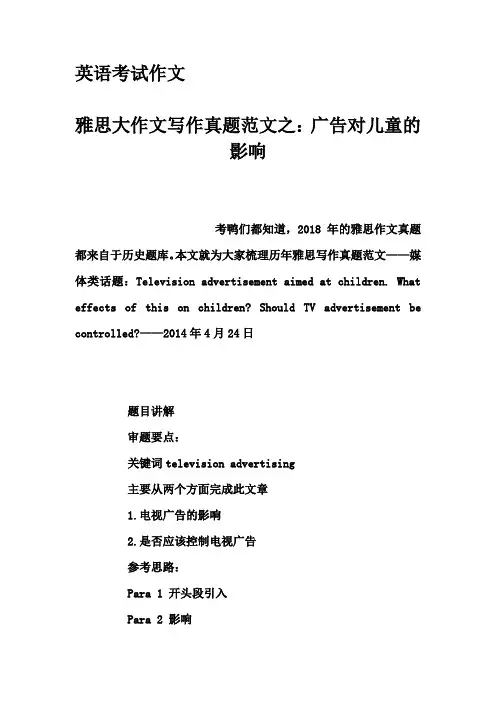
英语考试作文雅思大作文写作真题范文之:广告对儿童的影响考鸭们都知道,2018年的雅思作文真题都来自于历史题库。
本文就为大家梳理历年雅思写作真题范文——媒体类话题:Television advertisement aimed at children. What effects of this on children? Should TV advertisement be controlled?——2014年4月24日题目讲解审题要点:关键词television advertising主要从两个方面完成此文章1.电视广告的影响2.是否应该控制电视广告参考思路:Para 1 开头段引入Para 2 影响1) 生理:长时间专注屏幕造成视力下降2) 心理:一些偏商业的广告会促使孩子购买一些不必要的零食或者玩具,形成不良饮食或生活习惯;另外,广告中出现的一些负面信息一定程度上影响孩子身心健康Para 3:电视广告是否应该被控制取决于这类广告的积极或者消极性质1) 一些具有教育意义的广告应该被鼓励2) 而另外一些有可能会导致盲目消费的广告就应该被控制Para 4 结尾段总结雅思写作大作文范文Currently, a debatable argument over whether children should be exposed to the environment teeming with TV advertising has already aroused public’s attention. According to the discussion, this article tends to focus on the effects it may cause on little children as well as point out the opinion towards whether it should be limited or not.目前,关于儿童是否应该被电视广告所吸引的争论已经引起了公众的关注。
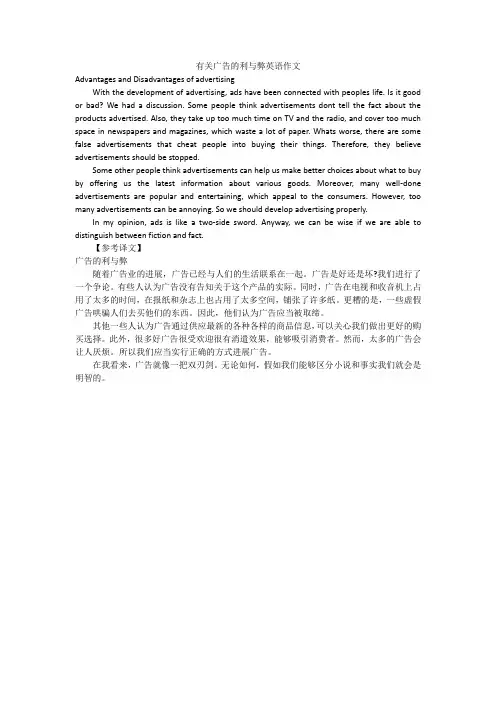
有关广告的利与弊英语作文Advantages and Disadvantages of advertisingWith the development of advertising, ads have been connected with peoples life. Is it good or bad? We had a discussion. Some people think advertisements dont tell the fact about the products advertised. Also, they take up too much time on TV and the radio, and cover too much space in newspapers and magazines, which waste a lot of paper. Whats worse, there are some false advertisements that cheat people into buying their things. Therefore, they believe advertisements should be stopped.Some other people think advertisements can help us make better choices about what to buy by offering us the latest information about various goods. Moreover, many well-done advertisements are popular and entertaining, which appeal to the consumers. However, too many advertisements can be annoying. So we should develop advertising properly.In my opinion, ads is like a two-side sword. Anyway, we can be wise if we are able to distinguish between fiction and fact.【参考译文】广告的利与弊随着广告业的进展,广告已经与人们的生活联系在一起。
电视广告作文英文英文:TV commercials have become an important part of ourdaily lives. They are used to promote products and services, and can be seen on almost every channel. In my opinion, TV commercials are both helpful and annoying.On the one hand, TV commercials can be helpful because they provide us with information about new products and services. For example, if I am interested in buying a new car, I can watch a commercial that shows me the features of the car and how it works. This can be very helpful in making a decision about what car to buy.On the other hand, TV commercials can be annoying because they interrupt our favorite TV shows and movies. Sometimes, the same commercial is shown over and over again, which can be very frustrating. For example, if I amwatching a football game and the same commercial is shownduring every commercial break, I may become annoyed and change the channel.Overall, I think TV commercials are a necessary evil. They provide us with information about new products and services, but can also be annoying when they interrupt our favorite TV shows and movies.中文:电视广告已经成为我们日常生活中重要的一部分。
垃圾食品的广告应该被禁止吗辩论英语作文I personally believe that junk food advertisements should be banned to protect the health of the public. Junk food is often high in calories, sugar, and unhealthy fats, which can lead to various health problems such as obesity, diabetes, and heart disease. These advertisements often target children and young people, promoting unhealthy eating habits from a young age.我个人认为应该禁止垃圾食品广告,以保护公众的健康。
垃圾食品往往高热量、高糖分和不健康的脂肪,会导致各种健康问题,如肥胖、糖尿病和心脏病。
这些广告通常针对儿童和年轻人,从小就在促进不健康的饮食习惯。
While some argue that banning junk food advertisements would violate freedom of speech and the rights of businesses to market their products, it is important to consider the negative impact these advertisements have on public health. Obesity rates have been on the rise, with junk food advertisements playing a significant role in influencing consumer choices and promoting unhealthy foods.尽管有人认为禁止垃圾食品广告会侵犯言论自由和企业营销产品的权利,但重要的是要考虑这些广告对公共健康的负面影响。
垃圾食品的广告应该被禁止吗辩论英语作文Should Ads for Junk Food Be Banned? An Elementary School DebateMy name is Jamie and I'm in 5th grade. Our class has been learning about nutrition and healthy eating habits. We've also been talking a lot about advertisements for junk foods like candy, chips, soda, and fast food. Some kids think these ads are really cool and make them want to eat those yummy treats. But others think the ads are kind of tricky and make junk food look much better than it really is. Our teacher asked us to debate whether junk food ads should be allowed or banned, especially ads aimed at kids. Here are some of the arguments from both sides:Why Junk Food Ads Should Be BannedA lot of kids think junk food ads are bad news and should be banned completely. Here are some of their main points:Junk food ads trick kids into wanting unhealthy snacks and meals.The ads make greasy fries, sugary cereals, and neon-colored candy look so delicious and fun. The truth is, those foods are super high in salt, fat, and sugar which can make you overweight and sick if you eat too much of them. The bright colors, cartooncharacters, and funny jokes in the ads are really just sneaky ways to get kids craving those yucky-for-you snacks.Junk food ads aim their marketing right at little kids.It's not fair for big greedy companies to target kids who are too young to understand that the ads are just trying to sell them stuff that isn't good for their bodies. Little kids see those ads and just want the toys, the bright packaging, the fun shapes - they don't realize the edible stuff inside is filled with empty calories and chemicals.Ads make it harder for parents to encourage healthy eating.Kids are surrounded by junk food ads on TV, websites, apps, video games - everywhere! All those enticing images make it really hard for parents to set good examples about nutrition at home. Even if parents try to only stock nutritious foods, their kids are still being constantly tempted and misled by slick advertising.Obesity and health problems are rising, partly due to heavy marketing.One out of every three kids in America is overweight or obese these days. While there are lots of reasons like lack of exercise, one big factor is that kids are eating way too much of the sugary, salty, fatty foods they see advertised everywhere. Allthose ads add up to poor eating habits that can lead to heart disease, diabetes, and other scary illnesses kids shouldn't have to worry about.Those are some of the biggest reasons why many people, including lots of parents, teachers, and doctors want junk food advertisements banned or severely limited, especially ones aimed at little kids. They think the ads are deceiving and unethical, making it too easy for kids to overdose onnutrient-poor snacks.Why Junk Food Ads Should Be AllowedOn the other side, there are also many who say junk food ads should still be allowed and aren't that big of a deal. Here are some of their main arguments:It's up to parents to monitor what their kids eat and watch.Companies selling cookies, chips, and burgers have a right to advertise their products, just like companies selling any other stuff. It should be a parent's responsibility to pay attention to the media their kids are exposed to and set reasonable limits. If a parent doesn't want their kid begging for every unhealthy snack they see in an ad, then they need to change the channel, monitor online activities, and say no firmly.Banning ads doesn't make people eat fewer unhealthy foods.Junk food has been around for decades, long before there were commercials advertising it to kids. People are still going to crave and consume treats even without ads. Kids are smart enough to know that just because something is advertised doesn't mean they have to have it. Banning the ads takes away companies' rights to free speech and doesn't solve core issues like poor eating habits or lack of self-control.Not all unhealthy foods are terrible in moderation.Companies should be allowed to advertise their legal products, including junk foods that are okay as occasional treats when practiced in moderation. An ice cream sundae or bag of chips every once in a while isn't going to make a kid obese. It's excessive overconsumption that's the real issue. Advertisements aren't forcing kids to binge on endless snacks.There are already some regulations on junk food ads aimed at kids.Advertising to children is already regulated to not be too manipulative or deceptive. There are policies against things like incorporating program characters too blatantly into ads ordirectly telling kids to beg their parents for products. If current regulations don't go far enough, they should be improved - but an outright ban isn't necessary or productive.Those in favor of still allowing junk food ads feel that some personal responsibility and moderation is required. They think the choice of what kids eat is ultimately up to parents, not advertisers. Banning the ads won't stop kids from craving treats or companies from producing them.The Great DebateAs you can see, there are lots of good points on both sides! Those who want the ads banned make fair points that the marketing tactics can be deceptive and harmful, especially for young kids. It's not easy for parents to compete with the endless stream of advertising that temps and misleads children about junk foods. Childhood obesity rates are legitimately high and unhealthy eating is a factor.On the flip side, there are also understandable arguments for still allowing the ads, with some reasonable controls. Companies have rights to market their legal products, even if they aren't the healthiest options. Moderation is key, and junk foods can be okay as occasional treats. Ultimately, the responsibility falls onparents to educate and monitor their kids. Banning ads won't stop snack cravings or improve self-control.Personally, I can see validity to both perspectives. I do think some junk food ads go too far in trying to brainwash kids, with silly cartoon characters and tricks that make corn syrup and grease look like fun. At the same time, I don't know if banning the ads completely is the best solution either - that seems like it goes too far in restricting companies' rights, and maybe we'd miss out on some funny ads for treats we're allowed to have in moderation.I think there could be a good compromise where junk food ads aimed at kids have to follow even stricter rules and limitations on marketing tactics. That way, we'd still get to see some ads for snacks and stuff, but they couldn't be as deceptive or make unhealthy stuff look quite so enticing and irresistible. And the real solution has to be parents staying involved and setting good examples about balance and moderation when it comes to junk food. Those are just my thoughts, but it's definitely a complicated issue with reasonable arguments on both sides of the big debate! What do you think?。
英语作文范文雅思写作高分范文:广告是否应该被严格控制Should widespread advertising be strictly limited in modern society? Some people claim that widespread advertising in the modern society has a harmful effect on young people. Therefore, advertisements should be strictly limited on TV, radio, the internet and in public places.To what extent do you agree or disagree with this statement?Although advertising has existed for thousands of years and is certainly not a recent invention, it is only in our modern society that the great influence and importance of widespread advertising is full play. However, in my opinion, many advertisements are harmful to young people’s mental development and, therefore, should be banned in the mass media.To begin with, various factors have given rise to the thriving of advertising industry, the most significant onebeing the proliferation of new products, services and technologies. In order to give their new inventions the utmost publicity, many businesses choose to promote them by broadcasting attractive advertisements through mass media, such as television, radio and internet. In addition, the increasingly fierce competition in the commercial world has compelled a lot of companies to resort to exaggerated and even deceitful advertisements to gain an edge over their business rivals.As many social critics have pointed out, the current trend in advertising exerts a corrupting influence on young people’s minds because there are always a lot of unwholesome and indecent contents in modern advertisements. For example, products such as wines, lingerie and cosmetics tend to use the female body and amorous scenes as the main attraction of their advertisements. What is even worse, a subculture of sexual suggestiveness and permissiveness seems to permeate the entire advertising industry. Young people, especially those adolescents, are often lured away from their studies and indulge themselves in erotic fantasiesTherefore, the authorities should take serious steps to counteract the negative effects of immoraladvertising. One effective approach is to establish and impose a strict censorship on all mass media, expunging any sexual explicit and implicit pictures and words from the advertisements they tend to show. Also, rules and regulations should be laid down to ban advertisements from certain public places, discouraging its rampant omnipresence and creating a cleaner and healthier social environment. Furthermore, all local governments can increase the costs of all kinds of advertisements to be shown or published through mass media, thus reducing their currently enormous quantities.In summary, the prevalence of advertising in our modern society and its inimical effects on the youth of today must be curbed, otherwise public morality and traditional cultures and values and even the future of the world will be caught in a precarious situation.Although advertising has existed for thousands of years and is certainly not a recent invention, it is only in our modern society that the great influence and importance of widespread advertising is full play. However, in my opinion, many advertisements are harmful to young people’s mental development and, therefore, should be banned in the mass media.To begin with, various factors have given rise tothe thriving of advertising industry, the most significant one being the proliferation of new products, services and technologies. In order to give their new inventions the utmost publicity, many businesses choose to promote them by broadcasting attractive advertisements through mass media, such as television, radio and internet. In addition, the increasingly fierce competition in the commercial world has compelled a lot of companies to resort to exaggerated and even deceitful advertisements to gain an edge over their business rivals.As many social critics have pointed out, the current trend in advertising exerts a corrupting influence on young people’s minds because there are always a lot of unwholesome and indecent contents in modern advertisements. For example, products such as wines, lingerie and cosmetics tend to use the female body and amorous scenes as the main attraction of their advertisements. What is even worse, a subculture of sexual suggestiveness and permissiveness seems to permeate the entire advertising industry. Young people, especially those adolescents, are often lured away from their studies and indulge themselves in erotic fantasiesTherefore, the authorities should take serioussteps to counteract the negative effects of immoral advertising. One effective approach is to establish and impose a strict censorship on all mass media, expunging any sexual explicit and implicit pictures and words from the advertisements they tend to show. Also, rules and regulations should be laid down to ban advertisements from certain public places, discouraging its rampant omnipresence and creating a cleaner and healthier social environment. Furthermore, all local governments can increase the costs of all kinds of advertisements to be shown or published through mass media, thus reducing their currently enormous quantities.In summary, the prevalence of advertising in our modern society and its inimical effects on the youth of today must be curbed, otherwise public morality and traditional cultures and values and even the future of the world will be caught in a precarious situation.英语作文范文英文作文模板英文作文范文。
垃圾食品广告是否应该被禁止英语作文Should Junk Food Advertisements Be Banned?IntroductionIn recent years, there has been a growing concern about the impact of junk food advertisements on public health, especially on children. Junk food ads are often seen as promoting unhealthy eating habits and contributing to the rise in obesity and related health issues. As a result, there have been calls for the banning of junk food advertisements in various media platforms. This essay will explore the arguments for and against banning junk food ads, as well as the potential alternatives to address the issue.Arguments for banning junk food advertisements1. Promotes unhealthy eating habits: One of the main reasons to ban junk food ads is that they promote unhealthy eating habits. Children are particularly vulnerable to these advertisements, as they are more easily influenced by marketing messages. By constantly bombarding them with ads for sugary and fatty foods, junk food companies are encouraging children to consume unhealthy foods, leading to a variety of health problems such as obesity, diabetes, and heart disease.2. Targeting vulnerable populations: Junk food companies often target vulnerable populations such as children, low-income communities, and people of color with their advertisements. These groups are already at a higher risk of obesity and related health issues, and junk food ads only exacerbate the problem by encouraging them to consume unhealthy foods. Banning these ads would help protect these vulnerable populations from the harms of junk food consumption.3. Social responsibility: In today's society, there is a growing recognition of the importance of social responsibility, especially in the context of public health. Junk food companies have a responsibility to promote healthy eating habits and contribute positively to society. By continuing to advertise unhealthy foods, they are failing to fulfill this responsibility and are instead prioritizing profits over the well-being of consumers.Arguments against banning junk food advertisements1. Freedom of speech: One of the main arguments against banning junk food ads is that it infringes on the freedom of speech of junk food companies. Advertising is a form of expression and companies have the right to promote their products through various channels. Banning these ads wouldlimit their ability to reach consumers and market their products, which could have a negative impact on their business.2. Personal responsibility: Another argument against banning junk food ads is that individuals should take personal responsibility for their food choices. While advertisements may influence consumer behavior to some extent, ultimately it is up to individuals to make healthy choices and avoid consuming too much junk food. Banning these ads does not address the underlying issue of personal responsibility and may not be effective in changing behavior.3. Economic impact: Banning junk food advertisements could have negative economic consequences, especially for media platforms that rely on advertising revenue. Junk food companies are major advertisers and banning their ads could lead to a significant loss of revenue for these platforms. This could affect their ability to provide content and services to the public, as well as impact the overall economy.Alternatives to banning junk food advertisementsWhile banning junk food advertisements may seem like a straightforward solution, there are alternative approaches that could be more effective in addressing the issue of unhealthy eating habits. Some of these alternatives include:1. Regulation and restrictions: Instead of an outright ban, governments could introduce regulations and restrictions on junk food advertisements to limit their impact on public health. For example, ads for unhealthy foods could be banned during children's programming or limited to certain time slots. This would still allow companies to market their products while reducing the exposure of vulnerable populations to junk food ads.2. Promote healthier options: Another alternative is to promote healthier food options through advertising and marketing campaigns. By highlighting the benefits of healthy eating and making nutritious foods more appealing to consumers, companies could encourage people to make better food choices. This would not only help to combat the negative effects of junk food ads but also promote a culture of health and wellness.3. Education and awareness: Finally, education and awareness campaigns could be used to inform the public about the dangers of junk food consumption and the benefits of a healthy diet. By empowering individuals with the knowledge and tools to make healthy choices, they could resist the influence of junk food advertisements and prioritize their health andwell-being. This would be a more sustainable approach to addressing the issue of unhealthy eating habits in the long term.ConclusionIn conclusion, the debate over whether junk food advertisements should be banned is a complex and contentious issue. While there are valid arguments for both sides of the debate, it is clear that something needs to be done to address the impact of these ads on public health. Rather than a blanket ban on junk food advertisements, a combination of regulations, promotions of healthier options, and education campaigns could be more effective in promoting healthy eating habits and addressing the root causes of obesity and related health issues. Ultimately, it is important to strike a balance between protecting public health and respecting the rights of junk food companies to advertise their products.。
电视广告的英语作文Television commercials are an integral part of modern advertising, designed to capture the attention of viewers and promote products or services in a short, engaging format. Here's an essay on the subject:The Impact of Television AdvertisingIn the digital age, television advertising remains a powerful tool for businesses to reach a broad audience. The art of crafting a compelling commercial lies in its ability to tell a story, create an emotional connection, and ultimately persuade viewers to take action.The Evolution of TV AdsTelevision advertising has evolved significantly since its inception. Early commercials were straightforward, focusing on the product's features and benefits. Today, they often incorporate humor, drama, or storytelling to stand out in the crowded marketplace. The rise of digital technology has also allowed for more sophisticated production techniques, making commercials more visually appealing.The Role of CreativityCreativity is key in television advertising. A well-crafted ad can turn an ordinary product into something extraordinary in the eyes of the consumer. It's not just about showcasing the product; it's about creating a narrative that resonates with the audience. This is why some commercials are remembered long after the product has been forgotten.Targeting the Right AudienceUnderstanding the target audience is crucial for effective television advertising. Ads are often tailored to appeal to specific demographics, ensuring that the message is relevant and impactful. This targeted approach can significantly increase the likelihood of viewer engagement and conversion.The Influence of CelebritiesCelebrities often play a significant role in television commercials. Their popularity can lend credibility and desirability to a product, making it more appealing to potential customers. However, it's important for the celebrity's image to align with the brand's values to avoid any disconnect.The Challenge of Short Attention SpansWith the advent of digital streaming and the ability to skip ads, capturing and maintaining the viewer's attention has become increasingly challenging. Commercials must be concise and impactful, delivering their message within a few seconds to avoid losing the audience.The Future of Television AdvertisingAs technology continues to advance, so too does the landscape of television advertising. Interactive ads, personalized content, and integration with social media platforms are becoming more prevalent. The future of TV ads will likely see a greater emphasis on engagement and personalization.ConclusionTelevision advertising is a dynamic and ever-evolving field. It requires a delicate balance of creativity, strategy, and technology to create commercials that not only entertain but also persuade. As the media landscape continues to change, advertisers must adapt and innovate to remain effective in reaching their audience.This essay provides an overview of the various aspects of television advertising, from its evolution to the challenges it faces in the digital age. It highlights the importance of creativity, audience targeting, and the use of celebrities, while also looking ahead to the future of the industry.。
高三英语作文:应不应该限制电视广告
With the development of a market-oriented economy, advertisement becomes a dominant feature in the television industry. Some people think it bring lots of advantages and convenience for human beings, while some people consider the disadvantages it brings are more than advantages and it should be restricted. What do you think of it? For me, i
think it should be banned. There are several reasons to support my view.
随着市场经济的发展,广告成为了电视行业的主要特征。
有些人认为它给人类带来了很多好处和便利,但有些人则认为它带来的弊大于利,应该限制电视广告。
你对这个问题有什么看法?对我来说,我认为电视广告应该要限制。
有几个理由能够支持我的观点。
Firstly, today’s TV advertisement has too much illusive descriptions. As most of the present advertisements are commercial, their purpose is to convince the public to buy their products and then get money from it. In the most cases, they will use exaggerated ways to convince people. Sometimes they will even show some false information to people. For example, the losing weight advertisement. If people can lose so much weight by having their medicine, the world will be no fat.
首先,今天的电视广告存有太多虚假的描述。
因为当前绝大部分广告都是商业性的,他们的目的就是说服大家购买他们的产品,然后从中赚钱。
在绝大部分情况下,他们都会用夸张的手法来说服人。
有时他们甚至会给人们一些虚假信息。
例如,减肥广告。
如果人们能够通过药物减肥,那这个世界上就不会有胖子。
Secondly, too much commercial advertisement will have negative effect on children. Television has become one of the necessary amusement tools in every family and nearly every family has one. Of course, it also becomes the amusement tool for children. If they have received so much information about the materials, their life value may be affected. What’s worse, it will affect their life purpose.
其次,过多的商业广告对孩子会有不良影响。
电视已成为每个家庭必备的娱乐工具之一,几乎每家每户都有。
当然,它也就成为孩子们的娱乐工具。
如果他们接收很多物质层次的信息,他们的人生价值观可能会受到影响。
更糟的是,甚至会影响他们的人生目标。
To sum up, too much TV advertisement brings more disadvantages than advantages. To the health of human beings and the next generation, i think TV advertisement should be restricted.
总之,过多的电视广告带来的弊大于利。
为了人类健康以及下一代,我认为电视广告应该要限制。